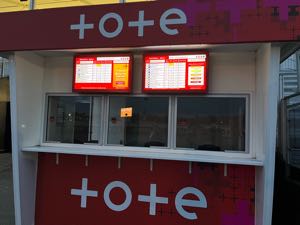 Britain is a nation of punters, and in the United Kingdom it seems like everybody likes a bet. In fact, according to research by the Gambling Commission approximately 50% of people in the country have participated in some form of gambling activity at least once in the past year. Part of this level of participation could be due to the availability of opportunity, with thousands of betting shops sitting in prime spots on high streets up and down the country.
Britain is a nation of punters, and in the United Kingdom it seems like everybody likes a bet. In fact, according to research by the Gambling Commission approximately 50% of people in the country have participated in some form of gambling activity at least once in the past year. Part of this level of participation could be due to the availability of opportunity, with thousands of betting shops sitting in prime spots on high streets up and down the country.
Almost all have also set up virtual betting shops to go alongside their traditional bricks and mortar businesses and millions are bet at the bookies every day. For those of you who have found this page in search of recommendations of online bookies, you can find a list of our favourites below. All of which, in our opinion, offer the best online products based on odds, markets, usability, offers and support. For a larger list of recommended online betting sites, see our top 10 page.
Best UK Online Bookmakers (With High Street Locations)
| Site | Established | No of Shops | Dep Via Shop | Visit |
|---|---|---|---|---|
| 1902 | 2,300+ | Yes £1 Min |
||
| 1926 | 1,800+ | Yes £5 Min |
||
| 1967 | 1,300+ | Yes £10 Min |
Note: Offers listed are for new customers only (18+). Terms & conditions will apply. #ad
Former High Street Bookies – Now Online Only
Note: Offers listed are for new customers only (18+). Terms & conditions will apply. #ad
All of the above maintains a strong presence on the British high street with the exception of BetVictor who sold their shops to fellow gentleman bookmaker Star Sports. In addition to acquiring their few remaining betting lounges Star Sports also bought their racecourse pitches meaning making Betvictor an online only bookie. Nevertheless they are an incredibly strong brand with deep ties to the UK and we still consider them an honorary brick and mortar bookie, even if they don’t have the shops any more!
Bet Online, Collect Your Winnings in Cash!
One of the biggest advantages of using an online betting site that also maintains a brick and mortar presence is that some (but not all) allow you to manage your accounts in person at their betting shops – meaning you can deposit in cash and have the funds instantly transferred to your online account to use whenever you like. Similarly you can place bets online and pick up your winnings in cash. This service is available from the following bookies:
Coral Connect (1800+ locations)
 Signing up for a Coral Connect card is free and allows you to deposit, withdraw and take advantage of various betting offers through any of their 1800+ betting shops. To use the service you first need to register for an online account with Coral and then head to your nearest shop and give them your online username. After a quick ID check they’ll issue you with a card and pin which you can use to manage your account in their shops. For full details of the Coral Connect service see the main Coral website.
Signing up for a Coral Connect card is free and allows you to deposit, withdraw and take advantage of various betting offers through any of their 1800+ betting shops. To use the service you first need to register for an online account with Coral and then head to your nearest shop and give them your online username. After a quick ID check they’ll issue you with a card and pin which you can use to manage your account in their shops. For full details of the Coral Connect service see the main Coral website.
High Street Betting Shops
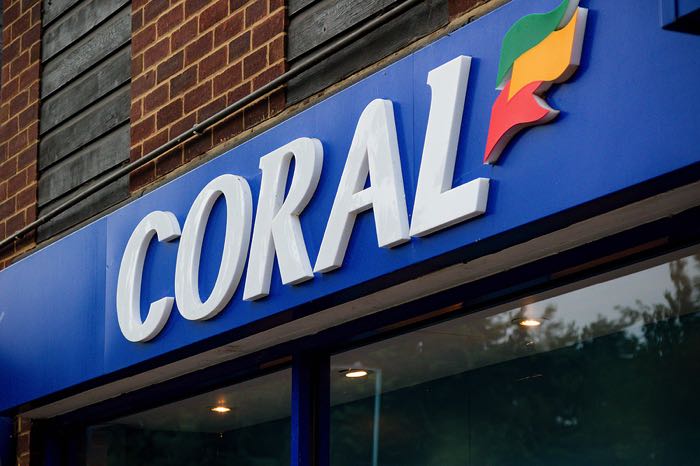
By Ben Gingell, Bigstockphoto
“Without greyhound racing there would be no bookies”. This quote, taken from the 2015 BBC documentary series, Britain at the Bookies, couldn’t be any further from the truth. The UK betting sector is currently booming with the phenomenon of globalisation meaning that it is possible to gamble on almost any professional sporting event in the world and whilst online gambling is huge, the high street bookmaker continues to thrive.
Gambling Laws
The Gambling Commission was set up under the Gambling Act 2005, to regulate commercial gambling within the UK. As legalised betting shops have existed since the Betting and Gaming Act of 1960 and the Betting Levy Act of 1961, there was a great period of relatively weak regulation in comparison to modern times, however the Commission are seeking to rectify this and this has helped customers feel more secure when gambling.
The Big Four
Since 1986, the “Big Four” have held a large percentage of the market share with William Hill, Coral, Ladbrokes and Tote being the major players. However, with the expansion of the betting industry other bookies such as BetVictor, Betfred and Paddy Power have entered into the market. Whilst Tote has left the high street since its privatisation and sale to Betfred in 2011, the big bookmakers have increased their presence on the high street with more and more shops being opened. However, despite this, it is worth noting that the high street sector remains half of what it was 30 years ago.
Expansion of the Betting Industry
The expansion of the betting industry has led to widespread protest at the opening of new shops. The arguments put forward by betting shop opponents and local councils tends to centre on the desire for bookmakers to open up premises in deprived areas with large scale unemployment. A relaxation of Government Legislation in 2008 has allowed for shops to be opened closer together than ever before. The financial crisis has led to large amounts of empty retail space being made empty on the high streets and this has led to more and more opportunities for bookmakers
Social Responsibility
This has not been popular with everyone and, for example, in late 2014, more than a quarter of all of the UK’s local authorities endeavoured to use the coalition Government’s localisation legislation in order to prevent the spread of betting shops on their high streets. The argument of the Association of British Bookmakers against the councils’ viewpoint is that there has been no proliferation of bookmakers in recent years. The bookmakers are also seeking to replicate the Drink Aware campaign with the Gamble Aware campaign in order to demonstrate their interest in social responsibility and allay the fears of those who protest against betting shop growth.
Main UK Bookmakers
Whilst there are plenty of independent bookmakers, especially at racecourses and dog tracks, the lions share of the bets go through the big bookies:
Coral
 Coral first began as a betting entity in 1926, with Joe Coral the founder establishing many speedway and greyhound tracks across the country. Coral then became one of the first bookmakers to open shops after the 1960 legalisation and have been a strong player in the UK betting shop market ever since.
Coral first began as a betting entity in 1926, with Joe Coral the founder establishing many speedway and greyhound tracks across the country. Coral then became one of the first bookmakers to open shops after the 1960 legalisation and have been a strong player in the UK betting shop market ever since.
The ownership of the company has changed a few times over the years, and the latest reshuffle sees the company merging with Ladbrokes to create a super-bookmaker with a combined business value of £2.3 billion. The new bookie will have so many betting shops they’re actually going to have to sell a few off to satisfy the monopolies commission.
Ladbrokes
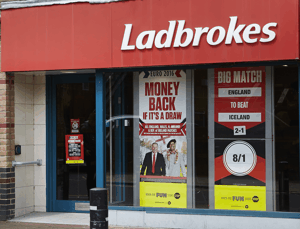 Ladbrokes was established in 1896 as commission agents for horses that were trained at Ladbroke Hall, with it adopting the Ladbrokes name in 1902. After World War II, Ladbrokes struggled due to the lack of disposable income in society. After the 1961 legislation, Ladbrokes used their funds to set up a series of betting shops. Ladbrokes has established itself abroad in recent years, setting up shops in Spain and Australia.
Ladbrokes was established in 1896 as commission agents for horses that were trained at Ladbroke Hall, with it adopting the Ladbrokes name in 1902. After World War II, Ladbrokes struggled due to the lack of disposable income in society. After the 1961 legislation, Ladbrokes used their funds to set up a series of betting shops. Ladbrokes has established itself abroad in recent years, setting up shops in Spain and Australia.
After the merger with Coral, the group are set to become the largest bookmaker in the UK with over 4,000 betting facilities and they now employ 30,000 people. Ladbrokes have recently announced a sponsorship partnership with the Scottish Premier League, as well as with other sports in order to increase the awareness of their brand.
Betfred
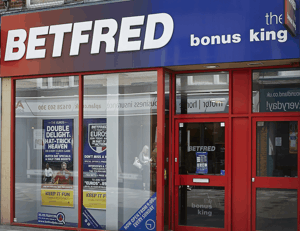 First established as a shop in Ordsall, Salford in 1967, Betfred (originally called Dones) now owns over 1,350 betting shops in the UK. Betfred were the first bookmaker to pay out early on people’s bets related to Manchester United winning the 1997/98 Premier League title. However, this proved to be costly for the firm as Arsenal ended up winning the league. Betfred are very active with football in particular, with them being the official partner of Wembley Stadium. This means that they operate the in-stadium betting facilities for all England and FA matches. In 2011 Betfred purchased Tote for £265 million. Betfred is also the world’s largest independent bookmaker and remains owned by brothers Fred and Peter Done.
First established as a shop in Ordsall, Salford in 1967, Betfred (originally called Dones) now owns over 1,350 betting shops in the UK. Betfred were the first bookmaker to pay out early on people’s bets related to Manchester United winning the 1997/98 Premier League title. However, this proved to be costly for the firm as Arsenal ended up winning the league. Betfred are very active with football in particular, with them being the official partner of Wembley Stadium. This means that they operate the in-stadium betting facilities for all England and FA matches. In 2011 Betfred purchased Tote for £265 million. Betfred is also the world’s largest independent bookmaker and remains owned by brothers Fred and Peter Done.
William Hill
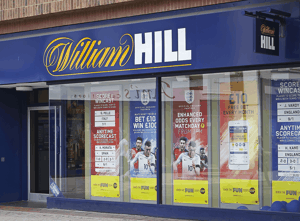 Part of the original “Big Four” bookmakers, William Hill still remain a very active and sizeable bookmaker, even being a member of the FTSE 250 Index. The company was initially founded by William Hill in 1934. At this point gambling was illegal in the UK. When gambling was legalised in 1961, William Hill wanted nothing to do with it due to the capital investment that purchasing licensed premises would require, although they soon changed their stance. William Hill have expanded into both the US and Australia. As well as this they sponsor a number of big sporting events including the PDC World Darts Championship. Before the Ladbrokes/Coral Merger, William Hill was the largest bookmaker in the UK, with them controlling a network of more than 2,360 licensed betting shops.
Part of the original “Big Four” bookmakers, William Hill still remain a very active and sizeable bookmaker, even being a member of the FTSE 250 Index. The company was initially founded by William Hill in 1934. At this point gambling was illegal in the UK. When gambling was legalised in 1961, William Hill wanted nothing to do with it due to the capital investment that purchasing licensed premises would require, although they soon changed their stance. William Hill have expanded into both the US and Australia. As well as this they sponsor a number of big sporting events including the PDC World Darts Championship. Before the Ladbrokes/Coral Merger, William Hill was the largest bookmaker in the UK, with them controlling a network of more than 2,360 licensed betting shops.
Paddy Power
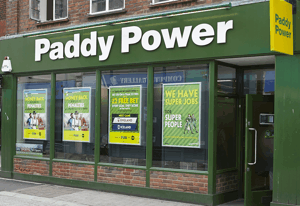 Paddy Power are quite possibly the most controversial of all UK and Irish bookmakers in terms of their advertising campaigns. Relatively modern in comparison to the aforementioned betting chains, Paddy Power was established in 1988 based in Dublin. Unlike most other chains that favoured side-streets, they decided to situate their first facilities in the most prominent streets and locations. In 2010, it was noted that Paddy Power were the largest bookie in Europe in terms of total share value and they are listed on both the Irish and UK stock exchanges. Their controversial advertising campaigns have been subject to much scrutiny over the years, including the an immigrant lorry campaign, an offer of refunds if Oscar Pistorius “walked” on his murder charge and a campaign that was essentially a Barack Obama assassination market!
Paddy Power are quite possibly the most controversial of all UK and Irish bookmakers in terms of their advertising campaigns. Relatively modern in comparison to the aforementioned betting chains, Paddy Power was established in 1988 based in Dublin. Unlike most other chains that favoured side-streets, they decided to situate their first facilities in the most prominent streets and locations. In 2010, it was noted that Paddy Power were the largest bookie in Europe in terms of total share value and they are listed on both the Irish and UK stock exchanges. Their controversial advertising campaigns have been subject to much scrutiny over the years, including the an immigrant lorry campaign, an offer of refunds if Oscar Pistorius “walked” on his murder charge and a campaign that was essentially a Barack Obama assassination market!
Stan James – now Mega Bet / Unibet
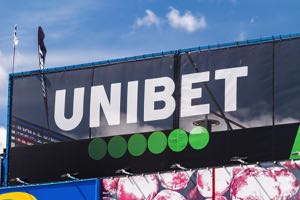 Stan James has a history in the UK going back to 1973 and operated around 90 betting shops on the British high street. In 2015 the business was split into two parts representing the online and high street markets. Stan James Online, as it became known, was sold to Unibet along with the rights to use the Stan James name whilst the betting shops rebranded as Mega Bet. The Mega Bet shops still exist today and can be found throughout the UK, however, Stan James Online shuttered it’s virtual doors in early 2018 with all existing customers migrated over to the main Unibet website.
Stan James has a history in the UK going back to 1973 and operated around 90 betting shops on the British high street. In 2015 the business was split into two parts representing the online and high street markets. Stan James Online, as it became known, was sold to Unibet along with the rights to use the Stan James name whilst the betting shops rebranded as Mega Bet. The Mega Bet shops still exist today and can be found throughout the UK, however, Stan James Online shuttered it’s virtual doors in early 2018 with all existing customers migrated over to the main Unibet website.
BetVictor
 BetVictor are an independent bookmaker whose roots go back to the 1940s and their headquarters are now located in Gibraltar. The move to Gibraltar came about in order to avoid the UK gambling tax and this occurred in 1998. Originally named after its owner Victor Chandler, it was rebranded in 2012 to BetVictor which was seen as being more easily transferable to other international territories. Michael Tabor, the prominent racehorse owner, took control in 2014, although Victor Chandler (son of the original Victor and Grandson of founder William Chandler) remains as a brand ambassador. The company states that it has over half a million customers worldwide, operating in over 160 different countries, although they sold their 41 betting shops in 2006. They now have just two high street outlets in Mayfair and Dublin and these “luxury betting lounges” are a far cry from the average betting shop.
BetVictor are an independent bookmaker whose roots go back to the 1940s and their headquarters are now located in Gibraltar. The move to Gibraltar came about in order to avoid the UK gambling tax and this occurred in 1998. Originally named after its owner Victor Chandler, it was rebranded in 2012 to BetVictor which was seen as being more easily transferable to other international territories. Michael Tabor, the prominent racehorse owner, took control in 2014, although Victor Chandler (son of the original Victor and Grandson of founder William Chandler) remains as a brand ambassador. The company states that it has over half a million customers worldwide, operating in over 160 different countries, although they sold their 41 betting shops in 2006. They now have just two high street outlets in Mayfair and Dublin and these “luxury betting lounges” are a far cry from the average betting shop.
What to Expect at the Bookies
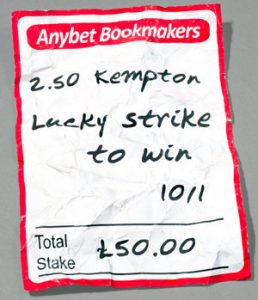 Over the years, betting shops have changed dramatically. Previously, they were centred almost exclusively around horse racing and greyhounds that was ongoing throughout the day. Within these betting shops there would be the racing form and tips for the events that were occurring on that particular day. Whilst it may sound hard to believe, in the earliest days of high street betting shops, people would bet on a race they couldn’t even listen to, let alone see, with results just being announced!
Over the years, betting shops have changed dramatically. Previously, they were centred almost exclusively around horse racing and greyhounds that was ongoing throughout the day. Within these betting shops there would be the racing form and tips for the events that were occurring on that particular day. Whilst it may sound hard to believe, in the earliest days of high street betting shops, people would bet on a race they couldn’t even listen to, let alone see, with results just being announced!
Whilst the racing and form can still be found in a bookies, more and more different things have been introduced into the shops. There are now large flat screen televisions in most bookies, covering lots of different sports, not just horse racing, and this enables customers to be able to check how their wagers are doing. Live television in these shops is something that was only introduced in 1986, with their previously only being coverage of the racing via radio – if you were lucky!
In order to further attract and keep punters, bookies now usually offer free tea and coffee services, whilst snacks such as chocolate and crisps are also available. Bookies were once smoke-filled, dirty places but increasingly they are clean, bright, airy and welcoming to all sorts of different gamblers, as the betting shops seek to appeal to wider market.
When placing a bet in store at a bookies, the easiest way to go about this is by picking up a plain betting slip. Most people tend to check the screens available in the store which as well as screening live racing, football and other sports, also highlight the odds that are available for the most popular bets. The odds can be confirmed at the desk, whilst bets are also placed manually this way, with payment now possible by card, cash and even via your online account with some bookies. Many betting shops, mainly for football but also for big events, have pre-printed coupons featuring various odds and markets and these are often a simpler way to place your bet, as opposed to hand-writing a slip.
FOBT Machines
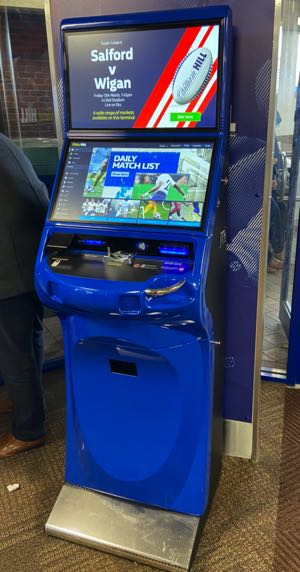 The most notable difference in betting shops in recent years has been the introduction of Fixed Odds Betting Terminals (FOBTs). These terminals have been crucial in bringing in a new generation of customers into bookies since their introduction to UK betting shops in 2001.
The most notable difference in betting shops in recent years has been the introduction of Fixed Odds Betting Terminals (FOBTs). These terminals have been crucial in bringing in a new generation of customers into bookies since their introduction to UK betting shops in 2001.
The terminals offer a range of slots and casino games but the most commonly played game is roulette, with the machines more or less identical to the roulette machines you would find in a real casino. Whilst the minimum wager amount allowed is just £1 or less, the maximum stake per spin is capped at £100, something which councils have protested against strongly, feeling it is too high, with a maximum single win of £500 also deemed too high.
Each individual betting shop is legally allowed up to four of these machines, with recent legislation allowing for players to set their own time and money limits on them and single bets of more than £50 requiring special authorisation. These Fixed Odd Betting Terminals constituted up to 52% of the UK bookmakers’ margin in 2014, with the Gambling Commission stating that £1.6bn was lost by customers in these machines. These are not the only machines bringing in tremendous amounts for the bookmakers. Other types of machines such as machines that are capped at a maximum of a £1 stake when combined with all other sports betting pulled in £1.bn. There are now over 33,000 Fixed Odd Betting Terminals in the UK, with each estimated to take almost £1,000 of punters’ money per week. The user group of these machines is dominated by the 18-34 age group, with these customers tending to be frequent gamblers who use these machines more than once a week.
Whilst these machines are incredibly important to the bookmakers due to the huge percentage of their turnover that they now create, they have become the most controversial issue within the UK betting industry. Credit Suisse recently warned bookmakers that it expects that the UK government will be cracking down on these machines by capping the maximum stake, thus making the amount of turnover that the bookmakers will be able to generate significantly lower.
FOBTs, dubbed the crack of gambling for their instant hit and highly addictive nature, are blamed for a rise in problem gambling within the UK, with 38% of all calls made to the gambling helpline being directly related to the usage of Fixed Odd Betting Terminals. The increased spending on these machines is also likely to result in a destruction of jobs, instead of a creation of jobs within the UK. This is because the added spending in bookmakers is likely to lead to a reduction in spending in other consumer services. Over the next 10 years, according to Landman Economics, it is likely that 20,000 jobs will be lost as a result of an increase in spending on these terminals. In conclusion, FOBTs have proved to be a very controversial issue within not just the betting industry but also the wider UK political sphere, with the restriction on them proving to be a big issue for the government in the aftermath of the 2015 General election.
History of Betting Shops
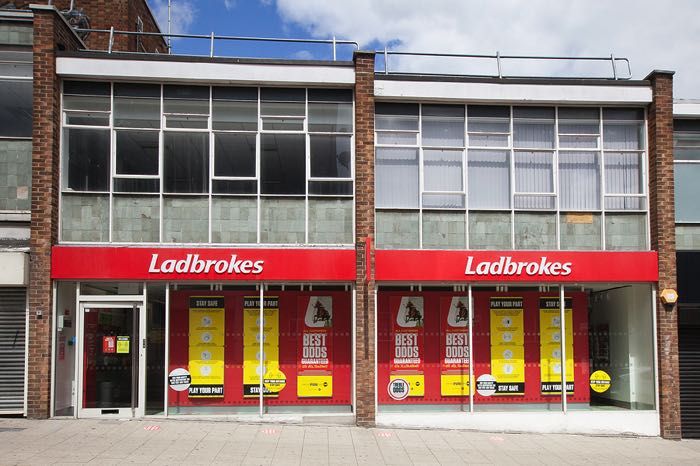
By Ben L Molyneux, Bigstockphoto
For more than a century, gamblers were denied the legal opportunity to wager their money away from a racecourse. However, this didn’t stop unlicensed premises emerging all over the UK, with their reportedly being more than 400 operating in London alone in the early 19th century.
1853 Betting Houses Act
The government sought to clamp down on these with the 1853 Betting Houses Act, which outlined that these shops would be driven out of existence. From here almost nothing for a long period of time, with racecourse betting still remaining the only legalised form of betting in the UK.
The Legalisation of Betting Shops
When betting shops were finally legalised in 1961, 10,000 bookies appeared on the streets in the six months directly after. Even now, over 50 years on, there are around the same amount as there were then, with most British high streets now having at least one bookmaker and most significantly more.
These original bookmakers were very limited in what they had inside the shop, until 1986 when legislation allowed for bookies to improve the comfort that they offered in the store. It was felt that shops should be deliberately unwelcoming in order to not openly promote betting but with such huge revenues at stake, both for the government in the shape of tax and also for the operators, this was always likely to change.
Gambling Regulations & Taxes
Due to the increasingly popular nature of gambling it has become more of an issue for the government to regulate. Before 1981 all off-course wagers had a 10% tax placed upon them (subsequently reduced to 9%) and this levy could be paid either before or after the bet had come in, which enabled individuals to pay the tax on their stake or their winnings. As a result of this the tax was smaller if placed beforehand but you ran the risk of paying tax on losing bets, whereas if you pay on winnings the total is higher but not relevant to losing wagers.
This tax was later removed by Chancellor Gordon Brown in 2001. Before then, a duty of 6.75% was placed upon all sporting bets, which was passed onto the punter in the shape of the tax mentioned above. This was then replaced by the Labour government with a 15% tax on gross profits that the bookies made.
Point of Consumption Levy
Recent changes to the taxation of the gambling industry are the machine games duty and, in 2014, thanks to the Gambling (Licensing & Advertising) Bill, a “point of consumption” levy. Point of consumption is a big issue in the modern world, with so many transactions being multi-national and with so many essentially UK bookies operating internet and phone betting from tax havens the Chancellor decided something had to be done. As such, online bookies now pay tax on bets from UK-based customers, regardless of where the transaction is deemed to have been taken or accounted.
The Betting Industry Today
Interestingly enough, William Hill have just outlined that these taxes have hit their operating profit for £44m, which is a substantial sum. The amount that the UK government makes through tax revenue from the betting industry is also very substantial, with the betting industry believed to contribute over £6bn to the government, which constitutes approximately 0.5% of total GDP. The sector also contributes around £700 million in further tax revenue, through the 100,000 employees that the sector employs.
Whilst not all of these taxes and jobs are directly related to high street betting shops, it’s clear that that gambling remains a very controversial topic, with tax, advertising and responsible gambling key issues. However, thankfully, for bookmakers and punters the gambling sector seems to still be in rude health and high street shops play a huge part in that and look set to continue to do so for a long time to come.




